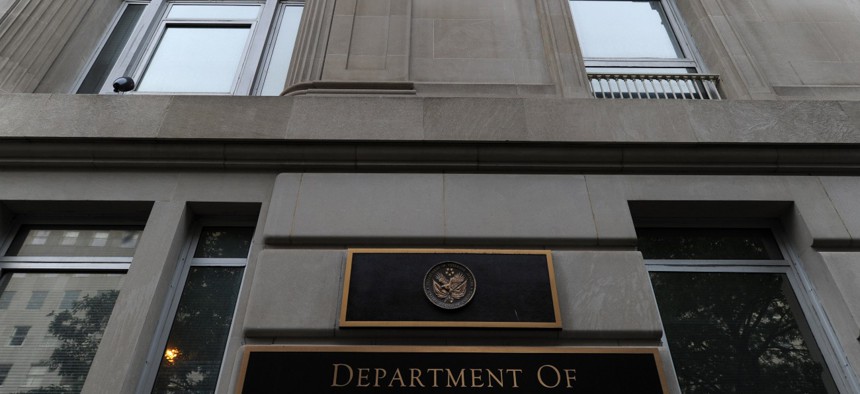
Matt McClain / The Washington Post via Getty Images
Lawmakers Eye Rolling Back Controversial VA Workforce Law, As the Department and Union Begin Negotiations
A bipartisan bill would effectively take two portions of the 2017 VA Accountability and Whistleblower Protection Act that were nullified by federal courts off the books.
A bipartisan pair of Pennsylvania lawmakers this month introduced legislation that would remove two controversial pieces of the 2017 VA Accountability and Whistleblower Protection Act, although those provisions have already been blocked in federal court.
The Protecting VA Employees Act (H.R. 6682), introduced by Reps. Conor Lamb, D-Pa., and Brian Fitzpatrick, R-Pa., would restore the Merit Systems Protection Board and arbitrators’ power to review adverse personnel actions, rather than just the evidence underlying those decisions, and it would increase the burden of proof for malfeasance that the VA must show from the current “substantial evidence” to a “preponderance of the evidence.”
Although the 2017 law was initially hailed as a needed reform to fight mismanagement and misbehavior at the department, employee groups and lawmakers have since criticized the department for focusing its efforts on punishing disproportionately low-ranking workers for minor offenses. Since then, federal judges have overturned the provisions governing how appellate bodies can review adverse personnel actions and the lower evidentiary standard.
In a statement, American Federation of Government Employees National VA Council President Alma Lee applauded the effort to codify the court decisions into law.
“Under the previous administration, the employees tasked with caring for our nation’s veterans had a target on their backs and were terminated at an alarming rate,” Lee said. “With this fix in the law, employees can rest assured that if discipline is proposed, they will have a fair process for pursuing appeals and continuing their careers serving veterans.”
Labor-VA Negotiations Begin on a Familiar Note
The VA is set to return to negotiations with AFGE beginning Tuesday on 12 provisions of their current collective bargaining agreement. The parties continue to operate under their 2011 union contract; although the Federal Service Impasses Panel imposed a largely pro-management agreement in 2020, a protracted legal battle prevented its implementation, and the department agreed to toss that contract last summer.
In an interview with Government Executive, Thomas Dargon, a supervisory attorney with AFGE’s national VA council, said the union will focus its energy on ensuring that employees can do their job safely, drawing on the lessons of the COVID-19 pandemic.
“We already have a great, robust health and safety article right now, which is a real testament to the power of collective bargaining and the types of protections you like to include in a collective bargaining agreement,” he said. “But there are certainly things related to the pandemic that we learned and would like to expand upon. We learned a lot about [personal protective equipment], supplies of PPE, and the need for an emergency temporary [safety] standard in place for health care workers. We don’t want employees’ concerns about health and safety to depend on [the presidential] administration or whether [the Occupational Safety and Health Administration] will or will not implement a permanent standard, so we want to include those in the CBA so that employees have consistency in their working standards.”
Dargon said the union also wants to make sure there is more structure around issues like temporary details, a practice that has seen more prominence as the pandemic has complicated staffing across health care facilities both in the private and public sectors.
“During COVID, we’ve seen a real increase in the number of employees detailed, transferred and reassigned around the hospital to meet staffing needs and address shortages,” he said. “We understand the need to staff every part of the hospital, but we need to make sure employees have the tools, resources and training to perform those duties safely and effectively . . . We want to make sure details are done with notice, and the union is given an opportunity to address concerns about training resources and skillsets.”
While Dargon said that the relationship between the VA and AFGE has improved somewhat since President Biden took office—in addition to tossing the Trump-era contract, the VA has restored labor-management forums—he said the department continues to announce changes to working conditions without first negotiating with unions, and management’s chosen contract provisions to renegotiate feel rooted in the previous administration’s priorities.
“Their [first proposal] on official time marks a drastic reduction in the amount of time that union representatives have to represent and defend VA workers,” Dargon said. “The VA has proposed a 30% cap on official time for almost every employee in the department, when there is not currently a cap at all.”
In 2018, Trump signed an executive order capping the use of official time at 25% of a union representative’s work hours. When Biden took office, he quickly rescinded the measure. Another management proposal that echoes the previous administration’s workforce policies governs the discipline of underperforming workers, Dargon said.
“Over the last few years, the VA has been on the losing side of a number of cases pertaining to the discipline and performance articles in our contract, particularly regarding the need to provide performance improvement plans and things like that,” he said. “In their initial proposals, the VA would strike the provisions they were found to violate. Requirements to provide a PIP would no longer exist, and instead there’s an ‘opportunity period’ that they’ve proposed.”
The VA declined to comment on the specifics of their proposals or negotiations with AFGE but said that the department “remains committed to serving veterans and complying with its collective bargaining obligations under the Federal Service Labor-Management Relations Statute.”







